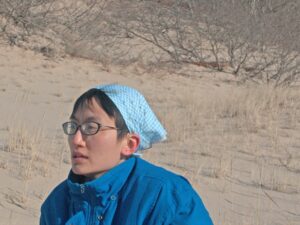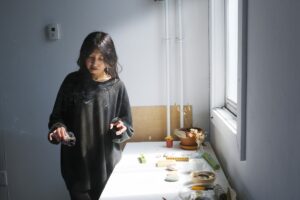On a Sunday afternoon in the cold, milky light of late March, Mengwei Ma, a visual arts fellow at the Fine Arts Work Center in Provincetown, is making a film in the Province Lands off Snail Road. Cherrie Yu, another FAWC fellow, lies in the dip behind the first dune, pretending to sleep. Wind lifts white poplin. Cold numbs bare feet. The horizon looks a little off, like something half-remembered.

Nearby, five people move quietly, murmuring cues, steadying the boom, and adjusting camera lenses. Around them, the sand is filled with shallow craters — the aftermath of a previous 14-take scene. The mood is hushed, careful, and a little otherworldly.
The camera, focused on Yu, starts rolling. From just off-camera, Elena Kovylyaeva calls out, “Why are you eating sand?” and then, “You don’t have to eat sand.” Yu sits up, blinks, and crawls away.
Ma scans the playback monitor as if she’s looking for a loose thread. Her short film, Cherry and Chestnut, is still taking shape. Conceived in January in rough scratchings on parchment, it’s coming to life with help from four other visual arts FAWC fellows: José De Sancristóbal is Ma’s director of photography; Carlos Arturo Zerpa is her producer; Yu plays Cherry, the protagonist; and Kovylyaeva plays a spectral presence — her face won’t appear on screen, only her feet and her voice, with her lines to be dubbed later in Mandarin. Like much of Ma’s work, the film blurs the lines between real and imagined, ritual and routine.
“Before shooting, I do scene work,” says Ma, which involves imagining and real-world scouting. To find this spot in the dunes, she wandered for hours the day before. “I try to think about why I’m writing this, what I’m getting out of it, what I need, how I should feel, and how I want to make people feel,” she says.
Cherry and Chestnut begins with a simple quest: Cherry, in search of her ex’s recipe for grits, returns to the spot in the dunes where she once buried a cookbook. What she finds instead is a spirit.
The spirit possesses Cherry and names itself Chestnut, Ma says. For one night, Cherry is someone else — the difference between the two is like the difference between “grits and sand,” Ma says, reading from the logline. “The possessed and the possession.”
Ma’s work lingers in the in-between — where identity slips, where time folds, when language starts to fray. Her films, mostly in Mandarin, include asides and subtitles in English. What is lost in translation, she thinks, might not really be lost at all. Small gaps in language, she says, “can be filled up with feeling and memory.”
The idea for Cherry and Chestnut came during a walk from Ma’s studio to the Provincetown library. “It was already pretty dark, and I was looking at this town,” she says. “It felt very unreal to me — like I was in a Miyazaki film or a Japanese fairy tale with European characters.”
The mood stuck. She started thinking about ghosts, and what it means to haunt a space you don’t belong to. “If you don’t have a body, you don’t have your past,” she says. “Or maybe you have too much past from other people, so you don’t know who you are. If you find another lonely soul, maybe you just take that body.”
She pauses. “That’s comforting,” she says, “but also very scary.”
Ma grew up in Zibo, a city in eastern China’s Shandong province. After getting her undergraduate degree at Syracuse University, she earned an M.F.A. in film at Columbia.
She knew she wanted to make a film in Provincetown but not about the people here. She didn’t feel close enough. She feels the distance, she says, “between the actual life here and my life.”
That sense of dislocation, of drifting slightly outside the frame, is a theme in her earlier films. Ma’s 2024 short, something out there, was made “in memory of the spring of 2023,” the film’s dedication states. She shot it in the Beijing apartment she shared with an ex-boyfriend and their orange cat.

In the short, Ma’s character avoids the world as it reopens post-pandemic and retreats into her private universe. In the hallway outside the apartment, she sits at a white table, drinking tea and whiskey and making excuses to people on the phone. Only when the table disappears does she realize how much it anchored her. Someone had put the table out on the street, and it was taken away. “It’s all cleaned up down there,” says her character, looking out the window. “Everything is gone.”
Ma’s 2018 film, Que Sera Sera, was inspired by a visit to the seaside city of Weihai, China, where she reunited with Yang Zhou, a childhood friend she hadn’t seen in years. The feeling between them reminded her of Edward Hopper’s A Woman in the Sun — a painting that casts Hopper’s model, his wife, Josephine, forward and backward at once. “He did it when they were quite old, but he painted her like how she looked when she was young,” says Ma.
“There was something about the hotel room I was staying in,” she says of her time in Weihai. “I could see the reflections of the mountain. I felt the passage of memory. Even the color of the towel made me want to make something and have Yang act in it.” She returned to Weihai in her third year at Columbia and spent several months filming. Que Sera Sera became her master’s thesis.
In the film, Ma plays a character wandering through Weihai watching strangers. She meets Yang, playing a character called Meng, beside a still carousel in an almost-empty amusement park. Just before the reunion, Ma’s character thinks, “Swimming, getting married, lying on the beach, or dying all feels the same in a town like this.” But reuniting with an old friend doesn’t feel the same. It is both more and less than she imagines.
Later, the friends sit in a café and open a package Meng ordered to mark the occasion. Inside is a puzzle made from a childhood photo of the two friends. The pieces spill out between them, but they never complete it. The image in the photo is never fully recovered.
Ma isn’t drawn to tight narrative arcs. What she wants is space — for feeling and maybe for connection. “I want to make art because I feel very lonely,” Ma says. “We’re all connected. And in playing with that relationship, you don’t feel so lonely anymore.” Slowly, the viewer realizes that the distortions in her work — pauses, translations, the strange logic of dreams — aren’t a barrier. They’re the way in.
The Possessed and the Possession
The event: Showcase and reading with Mengwei Ma, Elena Kovylyaeva, Carlos Arturo Zerpa, Kevin Fitchett, and Sara Martin
The time: Friday, April 18, 5 to 8 p.m.
The place: Fine Arts Work Center, 24 Pearl St., Provincetown
The cost: Free



